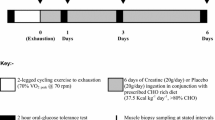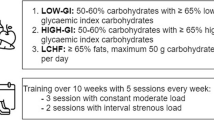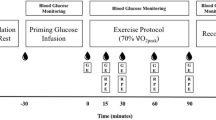Abstract
Muscle glycogen state and carbohydrate (CHO) supplementation before and during exercise may impact responses to high-intensity interval training (HIIT). This study determined cardiorespiratory, substrate metabolism, muscle oxygenation, and performance when completing HIIT with or without CHO supplementation in a muscle glycogen depleted state. On two occasions, in a cross-over design, eight male cyclists performed a glycogen depletion protocol prior to HIIT during which either a 6% CHO drink (60 g.hr−1) or placebo (%CHO, PLA) was consumed. HIIT consisted of 5 × 2 min at 80% peak power output (PPO), 3 × 10-min bouts of steady-state (SS) cycling (50, 55, 60% PPO), and a time-to-exhaustion (TTE) test. There was no difference in SS \({\dot{\text{V}}\text{O}}_{{2}}\), HR, substrate oxidation and gross efficiency (GE %) between CHO and PLA conditions. A faster rate of muscle reoxygenation (%. s−1) existed in PLA after the 1st (Δ − 0.23 ± 0.22, d = 0.58, P < 0.05) and 3rd HIIT intervals (Δ − 0.34 ± 0.25, d = 1.02, P < 0.05). TTE was greater in CHO (7.1 ± 5.4 min) than PLA (2.5 ± 2.3 min, d = 0.98, P < 0.05). CHO consumption before and during exercise under reduced muscle glycogen conditions did not suppress fat oxidation, suggesting a strong regulatory role of muscle glycogen on substrate metabolism. However, CHO ingestion provided a performance benefit under intense exercise conditions commenced with reduced muscle glycogen. More research is needed to understand the significance of altered muscle oxygenation patterns during exercise.











Similar content being viewed by others
Data availability
The datasets generated during and analysed during the current study are available from the corresponding author on reasonable request.
Abbreviations
- HIIT:
-
High-intensity interval training
- SS:
-
Steady state
- TTE:
-
Time-to-exhaustion
- HHb:
-
Deoxygenated hemoglobin
- O2Hb:
-
Oxygenated hemoglobin
- tHb:
-
Total hemoglobin
- PPO:
-
Peak power output
- GE:
-
Gross efficiency
References
Achten J, Jeukendrup AE (2003) Effects of pre-exercise ingestion of carbohydrate on glycaemic and insulinaemic responses during subsequent exercise at differing intensities. Eur J Appl Physiol 88(4–5):466–471. https://doi.org/10.1007/s00421-002-0730-1
Anderson T, Lane AR, Hackney AC (2016) Cortisol and testosterone dynamics following exhaustive endurance exercise. Eur J Appl Physiol 116(8):1503–1509. https://doi.org/10.1007/s00421-016-3406-y
Areta JL, Hopkins WG (2018) Skeletal muscle glycogen content at rest and during endurance exercise in humans: a meta-analysis. Sports Med 48(9):2091–2102
Bailey SJ, Vanhatalo A, Wilkerson DP, Dimenna FJ, Jones AM (2009) Optimizing the "priming" effect: influence of prior exercise intensity and recovery duration on O2 uptake kinetics and severe-intensity exercise tolerance. J Appl Physiol (Bethesda, Md: 1985), 107(6), 1743–1756. https://doi.org/10.1152/japplphysiol.00810.2009
Balsom PD, Gaitanos GC, Söderlund K, Ekblom B (1999) High-intensity exercise and muscle glycogen availability in humans. Acta Physiol Scand 165(4):337–345. https://doi.org/10.1046/j.1365-201x.1999.00517.x
Bartlett JD, Louhelainen J, Iqbal Z, Cochran AJ, Gibala MJ, Gregson W, Close GL, Drust B, Morton JP (2013) Reduced carbohydrate availability enhances exercise-induced p53 signaling in human skeletal muscle: implications for mitochondrial biogenesis. Am J Physiol Regul Integrat Compar Physiol 304(6):R450–R458. https://doi.org/10.1152/ajpregu.00498.2012
Bernards JR, Sato K, Haff GG, Bazyler CD (2017) Current research and statistical practices in sport science and a need for change. Sports (Basel, Switzerland) 5(4):87. https://doi.org/10.3390/sports5040087
Buchheit M, Abbiss CR, Peiffer JJ, Laursen PB (2012) Performance and physiological responses during a sprint interval training session: relationships with muscle oxygenation and pulmonary oxygen uptake kinetics. Eur J Appl Physiol 112(2):767–779. https://doi.org/10.1007/s00421-011-2021-1
Buchheit M, Cormie P, Abbiss CR, Ahmaidi S, Nosaka KK, Laursen PB (2009) Muscle deoxygenation during repeated sprint running: Effect of active vs. passive recovery. Int J Sports Med 30(6):418–425. https://doi.org/10.1055/s-0028-1105933
Burke LM, Ross ML, Garvican-Lewis LA, Welvaert M, Heikura IA, Forbes SG, Mirtschin JG, Cato LE, Strobel N, Sharma AP, Hawley JA (2017) Low carbohydrate, high fat diet impairs exercise economy and negates the performance benefit from intensified training in elite race walkers. J Physiol 595(9):2785–2807. https://doi.org/10.1113/JP273230
Burke LM, Sharma AP, Heikura IA, Forbes SF, Holloway M, McKay A, Bone JL, Leckey JJ, Welvaert M, Ross ML (2020) Crisis of confidence averted: Impairment of exercise economy and performance in elite race walkers by ketogenic low carbohydrate, high fat (LCHF) diet is reproducible. PloS one 15(6):e0234027. https://doi.org/10.1371/journal.pone.0234027
Carter H, Pringle JS, Boobis L, Jones AM, Doust JH (2004) Muscle glycogen depletion alters oxygen uptake kinetics during heavy exercise. Med Sci Sports Exerc 36(6):965–972. https://doi.org/10.1249/01.mss.0000128202.73676.11
Cole M, Coleman D, Hopker J, Wiles J (2014) Improved gross efficiency during long duration submaximal cycling following a short-term high carbohydrate diet. Int J Sports Med 35(3):265–269. https://doi.org/10.1055/s-0033-1348254
Cole M, Hopker JG, Wiles JD, Coleman DA (2018) The effects of acute carbohydrate and caffeine feeding strategies on cycling efficiency. J Sports Sci 36(7):817–823. https://doi.org/10.1080/02640414.2017.1343956
Coyle EF, Coggan AR, Hemmert MK, Ivy JL (1986) Muscle glycogen utilization during prolonged strenuous exercise when fed carbohydrate. J Appl Physiol 61(1):165–172. https://doi.org/10.1152/jappl.1986.61.1.165
Coyle EF, Sidossis LS, Horowitz JF, Beltz JD (1992) Cycling efficiency is related to the percentage of type I muscle fibers. Med Sci Sports Exerc 24(7):782–788
Dumke CL, McBride JM, Nieman DC, Gowin WD, Utter AC, McAnulty SR (2007) Effect of duration and exogenous carbohydrate on gross efficiency during cycling. J Strength Cond Res 21(4):1214–1219. https://doi.org/10.1519/R-22396.1
Daussin FN, Zoll J, Dufour SP, Ponsot E, Lonsdorfer-Wolf E, Doutreleau S, Mettauer B, Piquard F, Geny B, Richard R (2008) Effect of interval versus continuous training on cardiorespiratory and mitochondrial functions: relationship to aerobic performance improvements in sedentary subjects. Am J Physiol Regul Integrat Compar Physiol 295(1):264–272. https://doi.org/10.1152/ajpregu.00875.2007
Gatti R, De Palo EF (2011) An update: salivary hormones and physical exercise. Scand J Med Sci Sports 21(2):157–169. https://doi.org/10.1111/j.1600-0838.2010.01252.x
Gejl KD, Nybo L (2021) Performance effects of periodized carbohydrate restriction in endurance trained athletes - a systematic review and meta-analysis. J Int Soc Sports Nutr 18(1):37. https://doi.org/10.1186/s12970-021-00435-3
Hargreaves M, Costill DL, Coggan A, Fink WJ, Nishibata I (1984) Effect of carbohydrate feedings on muscle glycogen utilization and exercise performance. Med Sci Sports Exerc 16(3):219–222
Hargreaves M, McConell G, Proietto J (1995) Influence of muscle glycogen on glycogenolysis and glucose uptake during exercise in humans. J Appl Physiol 78(1):288–292. https://doi.org/10.1152/jappl.1995.78.1.288
Hearris MA, Hammond KM, Seaborne RA, Stocks B, Shepherd SO, Philp A, Sharples AP, Morton JP, Louis JB (2019) Graded reductions in preexercise muscle glycogen impair exercise capacity but do not augment skeletal muscle cell signaling: implications for CHO periodization. J Appl Physiol 126(6):1587–1597. https://doi.org/10.1152/japplphysiol.00913.2018
Hill EE, Zack E, Battaglini C, Viru M, Viru A, Hackney AC (2008) Exercise and circulating cortisol levels: the intensity threshold effect. J Endocrinol Invest 31(7):587–591. https://doi.org/10.1007/BF0334560
Impey SG, Hammond KM, Shepherd SO, Sharples AP, Stewart C, Limb M, Smith K, Philp A, Jeromson S, Hamilton DL, Close GL, Morton JP (2016) Fuel for the work required: a practical approach to amalgamating train-low paradigms for endurance athletes. Physiol Rep, 4(10): e12803. https://doi.org/10.14814/phy2.12803
Jeukendrup AE, Wallis GA (2005) Measurement of substrate oxidation during exercise by means of gas exchange measurements. Int J Sports Med 26(Suppl 1):S28–S37. https://doi.org/10.1055/s-2004-830512
Jones AM, Grassi B, Christensen PM, Krustrup P, Bangsbo J, Poole DC (2011) Slow component of VO2 kinetics: mechanistic bases and practical applications. Med Sci Sports Exerc 43(11):2046–2062. https://doi.org/10.1249/MSS.0b013e31821fcfc1
Kasper AM, Cocking S, Cockayne M, Barnard M, Tench J, Parker L, McAndrew J, Langan-Evans C, Close GL, Morton JP (2016) Carbohydrate mouth rinse and caffeine improves high-intensity interval running capacity when carbohydrate restricted. Eur J Sport Sci 16(5):560–568. https://doi.org/10.1080/17461391.2015.1041063
Kriel Y, Kerhervé HA, Askew CD, Solomon C (2016) The effect of active versus passive recovery periods during high intensity intermittent exercise on local tissue oxygenation in 18–30 year old sedentary men. PloS one 11(9):e0163733. https://doi.org/10.1371/journal.pone.0163733
Krustrup P, Söderlund K, Mohr M, Bangsbo J (2004) Slow-twitch fiber glycogen depletion elevates moderate-exercise fast-twitch fiber activity and O2 uptake. Med Sci Sports Exerc 36(6):973–982. https://doi.org/10.1249/01.mss.0000128246.20242.8b
Lane AR, Duke JW, Hackney AC (2010) Influence of dietary carbohydrate intake on the free testosterone: cortisol ratio responses to short-term intensive exercise training. Eur J Appl Physiol 108(6):1125–1131. https://doi.org/10.1007/s00421-009-1220-5
Lane SC, Areta JL, Bird SR, Coffey VG, Burke LM, Desbrow B, Karagounis LG, Hawley JA (2013) Caffeine ingestion and cycling power output in a low or normal muscle glycogen state. Med Sci Sports Exerc 45(8):1577–1584. https://doi.org/10.1249/MSS.0b013e31828af183
Laursen PB, Jenkins DG (2002) The scientific basis for high-intensity interval training: optimising training programmes and maximising performance in highly trained endurance athletes. Sports Med 32(1):53–73. https://doi.org/10.2165/00007256-200232010-00003
Lima-Silva AE, Pires FO, Bertuzzi R, Silva-Cavalcante MD, Oliveira RS, Kiss MA, Bishop D (2013) Effects of a low- or a high-carbohydrate diet on performance, energy system contribution, and metabolic responses during supramaximal exercise. Appl Physiol Nutr Metab 38(9):928–934. https://doi.org/10.1139/apnm-2012-0467
Lucía A, Pardo J, Durántez A, Hoyos J, Chicharro JL (1998) Physiological differences between professional and elite road cyclists. Int J Sports Med 19(5):342–348. https://doi.org/10.1055/s-2007-971928
MacInnis MJ, Gibala MJ (2017) Physiological adaptations to interval training and the role of exercise intensity. J Physiol 595(9):2915–2930. https://doi.org/10.1113/JP273196
Mitchell JB, Costill DL, Houmard JA, Flynn MG, Fink WJ, Beltz JD (1990) Influence of carbohydrate ingestion on counterregulatory hormones during prolonged exercise. Int J Sports Med 11(1):33–36. https://doi.org/10.1055/s-2007-1024758
Murias JM, Spencer MD, Kowalchuk JM, Paterson DH (2011) Muscle deoxygenation to VO2 relationship differs in young subjects with varying τVO2. Eur J Appl Physiol 111(12):3107–3118. https://doi.org/10.1007/s00421-011-1937-9
Nieman DC, Nehlsen-Cannarella SL, Fagoaga OR, Henson DA, Utter A, Davis JM, Williams F, Butterworth DE (1998) Influence of mode and carbohydrate on the cytokine response to heavy exertion. Med Sci Sports Exerc 30(5):671–678. https://doi.org/10.1097/00005768-199805000-00005
Nieman DC, Zwetsloot KA, Lomiwes DD, Meaney MP, Hurst RD (2016) Muscle glycogen depletion following 75-km of cycling is not linked to increased muscle IL-6, IL-8, and MCP-1 mRNA expression and protein content. Front Physiol 7:431. https://doi.org/10.3389/fphys.2016.00431
O’Brien WJ, Rowlands DS (2011) Fructose-maltodextrin ratio in a carbohydrate-electrolyte solution differentially affects exogenous carbohydrate oxidation rate, gut comfort, and performance. Am J Physiol Gastrointest Liver Physiol 300(1):181–189. https://doi.org/10.1152/ajpgi.00419.2010
O’Brien WJ, Stannard SR, Clarke JA, Rowlands DS (2013) Fructose-maltodextrin ratio governs exogenous and other CHO oxidation and performance. Med Sci Sports Exerc 45(9):1814–1824. https://doi.org/10.1249/MSS.0b013e31828e12d4
Paquette M, Bieuzen F, Billaut F (2018) Muscle Oxygenation Rather Than VO2max as a Strong Predictor of Performance in Sprint Canoe-Kayak. Int J Sports Physiol Perform 1–9. Adv Online Public https://doi.org/10.1123/ijspp.2018-0077
Paquette M, Bieuzen F, Billaut F (2021) The effect of HIIT vs. SIT on muscle oxygenation in trained sprint kayakers. Eur J Appl Physiol 121(10):2743–2759. https://doi.org/10.1007/s00421-021-04743-z
Psilander N, Frank P, Flockhart M, Sahlin K (2013) Exercise with low glycogen increases PGC-1α gene expression in human skeletal muscle. Eur J Appl Physiol 113(4):951–963. https://doi.org/10.1007/s00421-012-2504-8
Rothschild JA, Kilding AE, Broome SC, Stewart T, Cronin JB, Plews DJ (2021) Pre-exercise carbohydrate or protein ingestion influences substrate oxidation but not performance or hunger compared with cycling in the fasted state. Nutrients 13(4):1291. https://doi.org/10.3390/nu13041291
Shaw DM, Merien F, Braakhuis A, Maunder ED, Dulson DK (2019) Effect of a ketogenic diet on submaximal exercise capacity and efficiency in runners. Med Sci Sports Exerc 51(10):2135–2146. https://doi.org/10.1249/MSS.0000000000002008
Stellingwerff T (2012) Case study: Nutrition and training periodization in three elite marathon runners. Int J Sport Nutr Exerc Metab 22(5):392–400. https://doi.org/10.1123/ijsnem.22.5.392
Stepto NK, Carey AL, Staudacher HM, Cummings NK, Burke LM, Hawley JA (2002) Effect of short-term fat adaptation on high-intensity training. Med Sci Sports Exerc 34(3):449–455. https://doi.org/10.1097/00005768-200203000-00011
Tsintzas K, Williams C, Constantin-Teodosiu D, Hultman E, Boobis L, Clarys P, Greenhaff P (2001) Phosphocreatine degradation in type I and type II muscle fibres during submaximal exercise in man: effect of carbohydrate ingestion. J Physiol 537(Pt 1):305–311. https://doi.org/10.1111/j.1469-7793.2001.0305k.x
Turner CE, Byblow WD, Stinear CM, Gant N (2014) Carbohydrate in the mouth enhances activation of brain circuitry involved in motor performance and sensory perception. Appetite 80:212–219. https://doi.org/10.1016/j.appet.2014.05.020
Ufland P, Ahmaidi S, Buchheit M (2013) Repeated-sprint performance, locomotor profile and muscle oxygen uptake recovery: effect of training background. Int J Sports Med 34(10):924–930. https://doi.org/10.1055/s-0033-1333719
van Loon LJ, Thomason-Hughes M, Constantin-Teodosiu D, Koopman R, Greenhaff PL, Hardie DG, Keizer HA, Saris WH, Wagenmakers AJ (2005) Inhibition of adipose tissue lipolysis increases intramuscular lipid and glycogen use in vivo in humans. Am J Physiol Endocrinol Metabol 289(3):482–493. https://doi.org/10.1152/ajpendo.00092.2005
Vasquez-Bonilla AA, Camacho-Cardeñosa A, Timón R, Martínez-Guardado I, Camacho-Cardeñosa M, Olcina G (2021) Muscle oxygen desaturation and re-saturation capacity limits in repeated sprint ability performance in women soccer players: a new physiological interpretation. Int J Environ Res Public Health 18(7):3484. https://doi.org/10.3390/ijerph18073484
Waterworth SP, Spencer CC, Porter AL, Morton JP (2020) Perception of carbohydrate availability augments high-intensity intermittent exercise capacity under sleep-low, train-low conditions. Int J Sport Nutrit Exercise Metabol 30(2): 105–111. Adv Online Public https://doi.org/10.1123/ijsnem.2019-0275
Weltan SM, Bosch AN, Dennis SC, Noakes TD (1998) Preexercise muscle glycogen content affects metabolism during exercise despite maintenance of hyperglycemia. Am J Physiol 274(1):E83–E88. https://doi.org/10.1152/ajpendo.1998.274.1.E83
Yeo WK, Paton CD, Garnham AP, Burke LM, Carey AL, Hawley JA (2008) Skeletal muscle adaptation and performance responses to once a day versus twice every second day endurance training regimens. J Appl Physiol 105(5):1462–1470. https://doi.org/10.1152/japplphysiol.90882.2008
Yeo WK, McGee SL, Carey AL, Paton CD, Garnham AP, Hargreaves M, Hawley JA (2010) Acute signalling responses to intense endurance training commenced with low or normal muscle glycogen. Exp Physiol 95(2):351–358. https://doi.org/10.1113/expphysiol.2009.049353
Author information
Authors and Affiliations
Contributions
The study concept and design were completed by AR, PL, MW and AK. Data were collected and analysed by AR, WLC. Data interpretation was undertaken by AR, AK, WLC. Manuscript preparations were undertaken by AR, PL, MW, WLC, AK. All authors approved the final version of the paper.
Corresponding author
Ethics declarations
Conflict of interest
The authors declare no conflict of interest.
Additional information
Communicated by Michael I Lindinger.
Publisher's Note
Springer Nature remains neutral with regard to jurisdictional claims in published maps and institutional affiliations.
Rights and permissions
Springer Nature or its licensor (e.g. a society or other partner) holds exclusive rights to this article under a publishing agreement with the author(s) or other rightsholder(s); author self-archiving of the accepted manuscript version of this article is solely governed by the terms of such publishing agreement and applicable law.
About this article
Cite this article
Ramonas, A., Laursen, P.B., Williden, M. et al. Carbohydrate intake before and during high intensity exercise with reduced muscle glycogen availability affects the speed of muscle reoxygenation and performance. Eur J Appl Physiol 123, 1479–1494 (2023). https://doi.org/10.1007/s00421-023-05162-y
Received:
Accepted:
Published:
Issue Date:
DOI: https://doi.org/10.1007/s00421-023-05162-y




